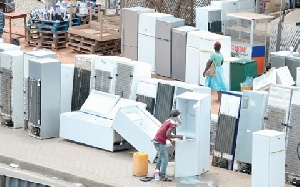Government has begun a US$25-million project to support Ghanaians acquire energy-efficient cooling devices.
This follows research which has shown, that second-hand electrical appliances consume two to three times the amount of energy needed.
The first phase of the project is targeted at salaried workers and will run for a year, after which non-formal sector workers will be rolled onto it.
The demand for electrical appliances in the country continues to see a rapid increase with many opting for secondhand devices.
This has come at a huge cost to the country’s energy supply as such devices consume more than can be provided.
The ECOFRIDGES project aims at supporting the purchase of 50,000 energy-efficient and climate-friendly cooling products to replace old existing equipment.
It is building on lessons from the 2012 project when people were asked to exchange old and used fridges for energy-efficient ones.
With the ECOFRIDGES project, the Energy Commission has partnered some Banks who will give interest-free loans to people to purchase energy-efficient fridges and air conditioners from selected outlets.
According to the Director of Renewable Energy, Energy Efficiency and Climate Change at the Energy Commission, Kofi Agyarko said the loans given will be interest-free.
He said investments in new energy-efficient domestic cooling technologies generate important cost savings for households and micro-entrepreneurs that allow them to recover their investment in a reasonable period of time, while also easing the strain on the electricity grid and reducing carbon emissions.
The money saved on energy could be used to cover other household needs, reduce energy demand, and thereby support more sustainable growth in Ghana’s economy.
Mr Agyarko said in order to scale up the adoption of energy-efficient appliances, investments must be suitably enhanced with effective market-based solutions, such as a financial strategy that overcomes the technical, financial, institutional, legal, and social barriers that are hindering the residential and light commercial sectors to invest in new energy-efficient cooling systems.
In a speech read for him, the Minister of Energy, John Peter Amewu said the 2012 refrigerator exchange project saved Ghana 400 megawatts hours, equivalent to 40 per cent of what Bui produces.
The Energy Minister said the ECOWAS Refrigerators and Air Conditioners Initiative (ECOFRIDGES) is a joint project by UNEP’s United for Efficiency initiative (U4E), and the Governments of Ghana and Senegal, and Basel Agency for Sustainable Energy (BASE), and the ECOWAS Centre for Renewable Energy and Energy Efficiency (ECREEE).
It aims to accelerate the switch to energy-efficient and climate-friendly cooling solutions in the region.
ECOFRIDGES is enabled via funding support by the Kigali Cooling Efficiency Program (KCEP).
The aim of the strategy is to enable the conditions required to mobilize investments in new energy-efficient and climate-friendly cooling technologies in the residential and light commercial sectors and motivate households to replace and upgrade their inefficient equipment through the development and launch of an innovative, market-based financial mechanism in Ghana.
Partner institutions include Hisense, Electroland, EcoBank, CalBank among others.
The Project which is also being implemented in Senegal is to ensure that by 2030 ECOWAS saves 4288 Gigawatt hours of electricity, US$472 million in energy bills and mitigate carbon emissions into the environment.
Business News of Sunday, 25 October 2020
Source: www.gbcghanaonline.com













